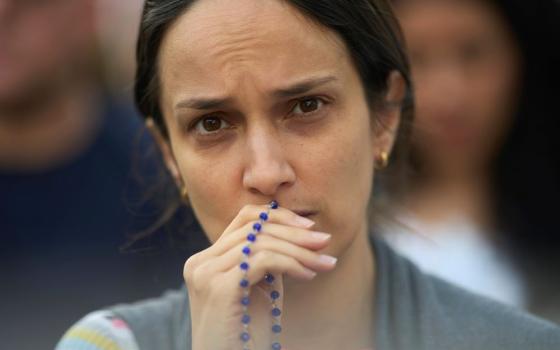It was disheartening to read that officers of SNAP are discouraging victims from meeting with the pope, deciding before it happens that the event is a waste of time and nothing more than a publicity ploy.
Like Tom Doyle, canon lawyer and longtime critic of the church, I believe the Pope Francis is sufficiently different from his predecessors that it is worthwhile for victims to meet him, look him in the eyes, tell him their stories, and ask for something. It is an act of great courage and hope for which any victim/survivor should be richly supported. It is also an act that no victim should be forced into or guilted out of.
Victims are men and women whose subjectivities and recovery roads are unique and personal. For some, meeting with pope may indeed lead to a renewed sense of betrayal. For others, it may represent one grace-full rest stop on a very long journey. For some, it may result in a reconnection with the Divine that has been missing and missed for decades; for others, it may free them to forever renounce their Catholicism without regret. For some, it may be disappointing and infuriating; for others, it may add to the binding of wounds.
To tell any survivor that the meeting with the pope “will actually hurt efforts to force the Church to reform because it will be all window dressing,” as SNAP’s David Clohessy is quoted as saying, is as arrogant and guilt-inducing as many too many church-issued statements about sexual abuse have been and thus is potentially destructive to vulnerable men and women. Neither David nor anyone else can predict ahead of time with such certainty what the outcome of this meeting will be for anyone involved in it or for the wider church and it hubris to say otherwise.
It is important that any survivor invited to this meeting reflect on and weigh the possible healing offered by an encounter with Francis against the perhaps equally possible pain and PTSD triggers that could ensue. No matter how the meeting turns out, it is not a panacea able to alleviate the past; even a pope cannot restore a stolen childhood or put a stop to nightmares and flashbacks.
Thorough exploration of hopes, fears and fantasies provoked by an invitation, preferably with a therapist experienced in working with trauma and familiar with the survivor’s stage of healing, can help an invited survivor discern whether and why s/he decides to accept or reject the invitation and then aid in processing the impact of the decision on healing. Neither decision is “right,” only right enough for that individual at that stage of healing. Either is both courageous and fraught. Similarly, victims who are not invited, but secretly wish they were may also want to articulate and work through reactions to the meeting with someone who can honor their desire to be recognized by the pope.
I have been working clinically with sexual abuse survivors for 30 years, men and women whose minds, bodies, and souls were invaded by individuals who imposed their own realities on children and adolescents who were also often guilted into cooperating with the abuser in order to maintain relational bonds. It is so frequently tempting to try to “rescue” or “protect” victims by offering a well-intentioned and ostensibly benign new reality. My job, however, is to help the survivors recover, or for the first time develop, confidence in their own minds, their own perceptions, their own desires, their own capacities to discern and decide how and in what directions to grow. It is my honor and responsibility to keep all possibilities possible long enough to allow the survivor to grow as a subject, not as an object living out what I think is best. I believe that is also the job of all who, like SNAP, say their commitment is to, “Protect the vulnerable, heal the wounded, prevent abuse.”
[Mary Gail Frawley-O'Dea is author of Perversion of Power: Sexual Abuse in the Catholic Church and a psychologist who has been working with sexual abuse survivors for 30 years.]


